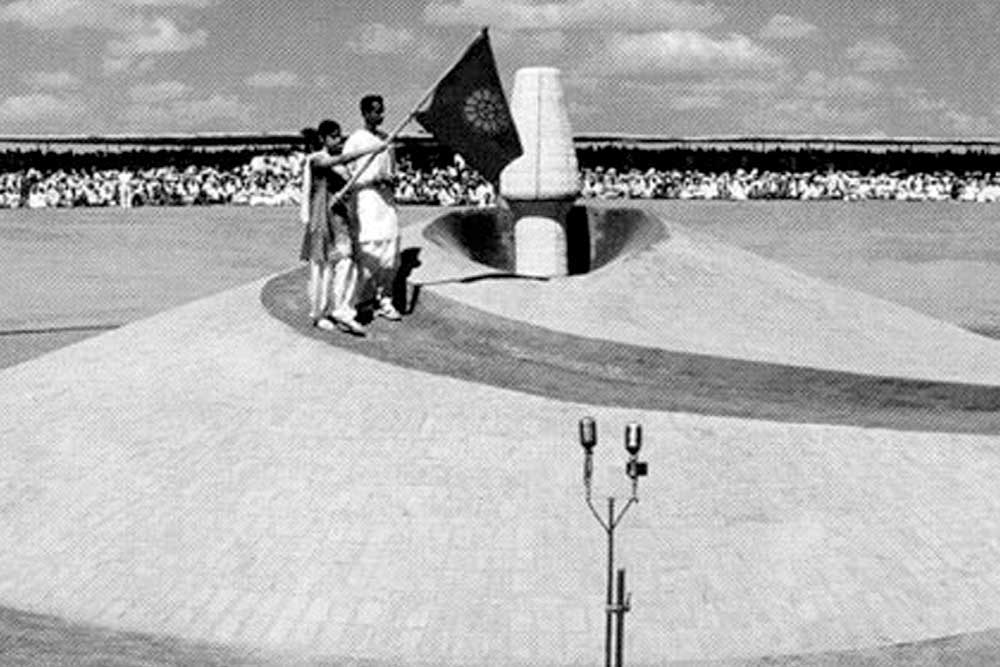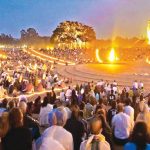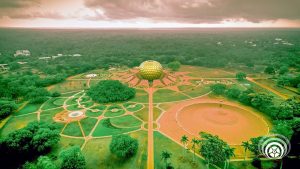
Auroville wants to be the first realisation of human unity based on the teaching of Sri Aurobindo, where men of all countries would be at home.
Auroville
The city-in-the-making is located on the Coromandel Coast in south India. It draws its inspiration from the vision and work of the renowned Indian seer and spiritual visionary, Sri Aurobindo. His spiritual collaborator, The Mother, founded the township in 1968 and gave its Charter, which you find scrolling on our homepage. The writings of these visionaries, and the specific guidelines for Auroville given by the Mother are crucial for in-depth understanding of what is trying to be achieved in Auroville, a collective experiment dedicated to human unity and international understanding.
Human Unity
“With the present morality of the human race a sound and durable human unity is not yet possible; but there is no reason why a temporary approximation to it should not be the reward of strenuous aspiration and untiring effort. By constant approximations and by partial realisations and temporary successes Nature advances“, writes Sri Aurobindo, and this reality stands central in Auroville and acts as perpetual encouragement for the residents to persevere. During all our meetings, deliberations and plannings, we are acutely aware of how vast and how high our aim is, for “— in it must be found the means of a fundamental, an inner, a complete, a real human unity which would be the one secure base of a unification of human life. A spiritual oneness which would create a psychological oneness not dependent upon any intellectual or outward uniformity.”
Puducherry
Auroville’s location in south India is connected with the fact that the Mother had been living in Puducherry since 1920. It was there, in the Sri Aurobindo Ashram in 1964 that the idea of Auroville was conceived. Both Sri Aurobindo and the Mother had expressed in their earliest writings the necessity of starting, at some point, a collective experiment under optimum conditions – ideally in the form of a city – in order to create a bridgehead for a new consciousness which was seeking to manifest in the world. The Ashram itself, formally created in 1926, was a first attempt in that direction. It was only in 1964 that the Mother felt that the time had come for such a bold experiment to be started on the bigger scale of a township.
The name ‘Auroville’ was given in homage to Sri Aurobindo, while also meaning ‘City of Dawn’. The idea was recognised and taken up by the Government of India. A location near to Pondicherry was found. The time was right, the wheel set in motion, and support started coming in. The inauguration took place on February 28th, 1968.
Worldwide support
Since the very beginning, Auroville has received the unanimous endorsement of the General Conference of UNESCO in 1966, 1968, 1970, 1983, 2007. Governmental and Non-Governmental Organisations in India and abroad have funded various development programmes, and donations have been received from foundations in Europe and the USA, from Auroville International Centres, and from private donors around the world. The residents themselves have also made, and continue to make, a major contribution of their resources and energy to the project.
Multifarious activities
Auroville is intended as a city for up to 50,000 inhabitants from around the world. Today its inhabitants number around 2000 people, drawn from some thirty countries. They live in 100 settlements of varying size, separated by village and temple lands and surrounded by Tamil villages with a total population of over 35,000 people. Their activities are multifarious, and include afforestation, organic agriculture, educational research, health care, village development, appropriate technology, and building construction, information technology, small and medium scale businesses, town planning, water table management, cultural activities and community services.
Independent legal body
In 1988, the Government of India passed the Auroville Foundation Act to safeguard the development of Auroville according to its Charter. This Act established three constituent bodies: the Governing Board, which would oversee the development of the township in collaboration with its inhabitants, the Residents Assembly and the International Advisory Council, which can provide international support and advice, when required, to the Governing Board.
Faith in humanity’s future
As the world is rapidly changing and groping for new paradigms to re-model itself, so Auroville stands poised at the start of a new millennium, ready to enter a new phase of its development and growth, and aware of a new flowering of the faith in humanity’s future that it represents.





